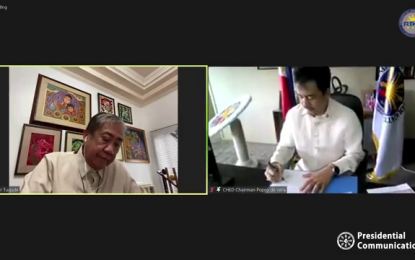
MANILA – The Commission on Higher Education (CHED) and the Department of Transportation (DOTr) on Thursday inked a memorandum of agreement (MOA) that would ensure the future of the country’s railways and to better educate railway sector workers.
The MOA, signed by CHED Chairperson Prospero de Vera III and DOTr Secretary Arthur Tugade, aims to fast-track and combine the two agencies ‘ human resources and initiatives to develop the quality and competitiveness of the country’s railway sector workers.
Led by the Philippine Railways Institute (PRI), the program is expected to provide opportunities for both students and existing railway workers to pursue education or continuous professional training related to railway operations.
In a virtual presser, Tugade said the continuing education for railway workers is important, noting that railway infrastructure would not last long without educated railway engineers and maintenance personnel.
“Kung hindi natin gagabayan ng continuing education and training ito, hindi po magtatagal ‘yung infrastructure na ‘yan (If we don’t guide the railway sector with continuing education and training, those infrastructures will not last long),” Tugade said.
From the current 77 kilometers of operable railways throughout the country, he said the government plans on extending this to 1,200 kilometers in 2022 and beyond that will result in a need for more railway professionals in the future.
“With the goal as enormous as this, we will be needing indeed the help and expertise of quality railway personnel,” Tugade said.
“It is my hope that with the partnership initiative we have strengthened today, the country will soon be known as a primary railway manpower source. I am looking forward to witnessing our railway personnel step up and achieve significant milestones in their chosen career,” Tugade said.
CHED’s role in the program, de Vera said, is to develop a system of credits to convert PRI’s certification training into academic units; review PRI’s program and imbed this into existing engineering curricula and/or elective subjects; mobilize top engineering colleges, universities and other higher education institutions to provide trainers in the PRI certificate program; and to develop links between the Philippines and Japan for joint research and development projects on railway development.
“This is a long-term initiative. Hindi ito dahil ine-expand lang natin ang railways. Talagang naghahanap ang Komisyon ng magandang pagtutulungan at paano makakatulong sa DOTr para pagtulungan yung pagdevelop ng ating rail (This is not just because we’re currently expanding our railways. CHED is looking for partnerships and how it could help the DOTr develop our railways),” de Vera said.
To date, DOTr Undersecretary Anneli Lontoc, PRI executive director, said the institution provides refresher training courses—currently available online due to the pandemic—to those already working in the country’s railways.
“Sa ngayon, meron na tayong tatlong daan mahigit na na-train na rail workers at sila po ay nasa existing rail operators katulad ng MRT-3, LRT-1 (Right now, we have trained more than three hundred rail workers all working for existing rail operators such as the MRT-3 and the LRT-1),” Lontoc said.